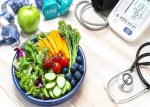It is a no-brainer that when with COVID-19 the body needs to fight off the virus, and in doing so, what goes on your plate matters. Since infections significantly reduce energy levels and loss of muscle mass leads to weakness and fatigue, it is important to eat a balanced and nutritious diet.
Load up on Vitamin C
Vitamin C can help ward off infections, build antibodies, and boost overall immunity. Bipin Jibhakate, Consultant, Critical Care Medicine, and ICU Director, Wockhardt Hospital, Mira Road, Mumbai. Huh.
Increase protein intake
Ideally, a protein-rich diet should be taken to combat muscle loss and maintain metabolic functions. Therefore, pulses, soya, milk products, nuts, seeds, khichdi, paneer, curd, eggs, chicken and fish should be included in the diet. Grill, steam or fry any food instead of frying it. “Eat lots of fresh fruits and vegetables or add them to smoothies or shakes,” says Dr. Zibhakte. Try to take milk, pan and drink enough water after the advice of the doctor. You can also have coconut water, kimchi and kombucha as they are rich in probiotics and can boost immunity. Chole, paneer, seeds and nuts and makhana are good options for snacking. Try to include eggs and boiled sprouts in breakfast and eat at least one fruit a day.
Read More: OnePlus TV Y1S 32-inch and 43-inch Renders Leak Out Ahead of February 17th Launch
Modify your diet plan
Diet modification is important when transitioning down to COVID-19, what you eat and drink will play a big role in determining how quickly you are able to get back on your feet. According to Shruti Ji, Dietitian and Nutritionist, Manipal Hospital, Hebbal, Bengaluru, “Proper nutrition and hydration are important and your meal plan should take this into account. Remember to eat small portions of a nutrient-rich diet frequently every two hours and drink fluids/water after every hour. While ginger tea/coffee/skimmed milk can be enjoyed early in the morning, for breakfast, it can be toast with omelet, idli with mint chutney, oat porridge, or bajra upma. For lunch, have chapati or rice with vegetables, lentils, and vegetable/chicken/cheese/egg curry, and porridge khichdi with vegetables for dinner. Drink skimmed milk mixed with a pinch of turmeric at bedtime.
Liquids and more fluids
Drinking water or fluids is important to replace body fluid loss and dilute respiratory secretions. About two to three liters of water, along with soups such as vegetable soup or chicken broth soup, help. As do herbal teas. When you have covid the digestive system goes for a toss. Fresh orange juice prepared at home helps in boosting the immune system, removes toxins from the body, and also aids in digestion.
Must eat when healthy
You need to include every nutrient in the diet. Eat whole grains and pumpkin seeds as well. To strengthen the immune system, try herbal tea and turmeric milk, and try carrots in it. Include soups like broccoli, tomatoes and even rasam,” advises Dr. Jibhkate.
Stick to these after recovery
A well-balanced diet is equally needed after recovery and should include fluids such as lassi and amla juice, green leafy vegetables such as spinach, cabbage, lettuce, and kale to boost immunity. Salmon and tuna are rich in vitamin A and vitamin B, which help reduce inflammation.
Remember to avoid alcohol, smoking and passive smoking after recovery as alcohol will damage the liver and smoking takes a toll on the lungs, which have already been adversely affected by COVID. Cut down on sweets, sweets, ice cream, candy, chocolate and outside food. Homemade food is the best option while recovering.Buttermilk rich in iron, calcium and magnesium also helps in hydration, eases digestion and acidity and prevents dehydration.



